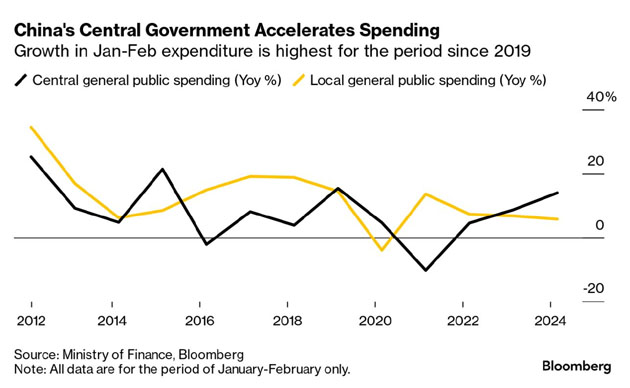Recent Posts
- Chart: Wind Overtakes Fossil Fuels as the UK’s Largest Power Generation Source
- Charts: Demand for Gold Rose in China Amid Limited Investment Options
- Chart: Inflation Is Resurfacing Globally in Many Countries
- Chuckles of the Day
- Chart: U.S. Trade Deficit with China Narrows to the Lowest Since 2010
- China’s Flying Cars Ready for Liftoff with EV Technology
- Infographic: Countries With the Largest Happiness Gains Since 2010
- How to Die in Good Health
- Chart: China Household Consumption vs. World Average
- Music Video: You’re No Good
- Chart: What Are the Biggest Perceived Dangers of AI?
- Why Don’t Rich People Eat Anymore?
- Infographic: The Countries That Have Become Sadder Since 2010
- China’s Rapid Solar Growth Slows as Grid Seeks to Keep Pace
- Humour: News in Cartoon
- Chart: Despite Comeback in the U.S., Vinyl Is Still Far From Its Glory Days
- Why Has Gold’s Inverse Relationship with the US dollar Reversed?
- Huawei’s Smartphone Comeback Continues As New Pura 70 Models Sell Out
- China’s Small Towns Boom as Megacities Lose Appeal With Brands
- In Pictures: Food of JL Studio in Taichung, Taiwan
- Chart: U.S. Mortgage Rates Climb Past 7% for the First Time in 2024
- China Restates Need for Steady Yuan Amid Fragile Confidence
- Infographic: 4 Reasons Why Lithium Could Be the Next Gold Rush
- Efforts Needed from Local Governments to Improve Innovation Ecosystem in China
- Humour
- Infographic: Worldwide Revenue Share of U.S. Listed Semiconductor Companies in 2023
- Xi Orders China’s Biggest Military Reorganization Since 2015
- Chart: Why People Run?
- What Makes Housing So Expensive in the U.S.?
- Humour: News in Cartoon
- Charts: Soaring Russian Oil Imports Drag OPEC’s Market Share in India to Record Low
- Chart: China Is Dumping US Treasury
- Infographic: The Top 15 Countries by Carbon Tax Revenue
- Study Shows Canadians Pay “Significantly” Higher Tax Rates than Americans
- Chart: Buzz-Free Drinking? The Rise of Non-Alcoholic Beer
- Meet AI001, Alibaba’s First AI Employee
- In Pictures: 2024 Lotus Emira First Edition V6 6-Speed
- Scientists Unveil Breakthrough in Fusion Reactor Technology
- Chart: U.S. and China Dominate the Art Market
- Capitalism Has Failed
Archives
- April 2024
- March 2024
- February 2024
- January 2024
- December 2023
- November 2023
- October 2023
- September 2023
- August 2023
- July 2023
- June 2023
- May 2023
- April 2023
- March 2023
- February 2023
- January 2023
- December 2022
- November 2022
- October 2022
- September 2022
- August 2022
- July 2022
- June 2022
- May 2022
- April 2022
- March 2022
- February 2022
- January 2022
- December 2021
- November 2021
- October 2021
- September 2021
- August 2021
- July 2021
- June 2021
- May 2021
- April 2021
- March 2021
- February 2021
- January 2021
- December 2020
- November 2020
- October 2020
- September 2020
- August 2020
- July 2020
- June 2020
- May 2020
- April 2020
- March 2020
- August 2017
- June 2017
- May 2017
- March 2017
- February 2017
- January 2017
- December 2016
- November 2016
- October 2016
- September 2016
- August 2016
- July 2016
- June 2016
- May 2016
- April 2016
- March 2016
- February 2016
- January 2016
- December 2015
- November 2015
- October 2015
- August 2015
- July 2015
- June 2015
- May 2015
- April 2015
- March 2015
- February 2015
- January 2015
- December 2014
- November 2014
- October 2014
- September 2014
- August 2014
- July 2014
- May 2014
- April 2014
- March 2014
- February 2014
- January 2014
- December 2013
- November 2013
- October 2013
- September 2013
- August 2013
- July 2013
- June 2013
- May 2013
- April 2013
- March 2013
- February 2013
- January 2013
- December 2012
- November 2012
- October 2012
- September 2012
- August 2012
- July 2012
- June 2012
- May 2012
- April 2012
- March 2012
- February 2012
- January 2012
- December 2011
Categories
- Aging
- Analysis
- Art
- Banking
- Bond
- Business
- Classic Car
- Climate
- Commercial Real Estate
- Commodity
- Construction
- Consumption
- Culture
- Currency
- Debt
- Demographic
- Economy
- Education
- Employment
- Energy
- Entertainment
- Environment
- Explainer
- Finance
- Food
- Gold
- Gold Stock
- Health
- History
- Housing
- Humour
- In Pictures
- Infographic
- Information
- Interview
- Investment
- Life
- Links
- Manufacturing
- Medicine
- Michelin Restaurant
- Military
- Monetary
- Money
- Music
- News
- Opinion
- Person
- Personal Wealth
- Policy
- Politics
- Real Estate
- Report
- Research
- Restaurant
- Science
- Services
- Society
- Stock
- Stock Market
- Study
- Technology
- Tourism
- Trade
- Trading
- Transportation
- Travel
- Uncategorized
- Video
- Wealth
AI
Alzheimer's
Asia
Australia
Battery
Bitcoin
Brain
Canada
Car
Car Sales
Central Bank
China
Cities
Coal
Copper
Countries
COVID-19
COVID-19 Origin
COVID-19 Vaccination
COVID-19 Variant
CPI
Crude Oil
Debt
Dementia
Democracy
Electric Cars
Electricity
Electric Vehicles
EU
Europe
Eurozone
EV
Exercise
Federal Reserve
G7
Gasoline
GDP
Germany
Global
Happiness
Heart Health
Hong Kong
India
Inflation
Interest Rate
Internet
Israel
Japan
Lithium
Media
Military
Mortgage
Oil
Pandemic
PMI
Recession
Retail Sales
Robotic
Russia
S&P 500
Semiconductor
Singapore
Sleep
Smartphone
Social Media
Solar
Taiwan
UK
Ukraine War
US
USD
US Treasuries
Vaccine
World
Yuan
